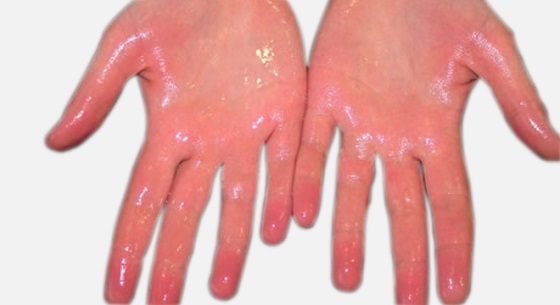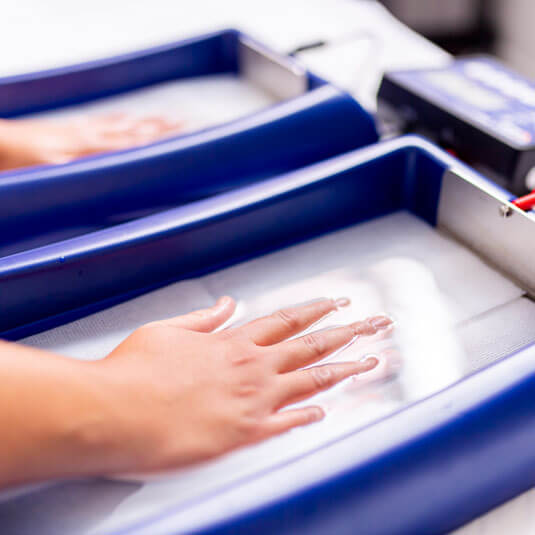Comprehensive Guide to Sweaty Hands Treatment: Proven Dermatology Methods
Comprehensive Guide to Sweaty Hands Treatment: Proven Dermatology Methods
Blog Article
Comprehending the Source of Excessive Sweating and Its Effect On Day-to-day Live
Excessive sweating, likewise called hyperhidrosis, is a condition that impacts a substantial section of the population, yet its underlying reasons and effects on daily functioning stay rather enigmatic. While it is generally recognized as a physical feedback to regulate body temperature, the triggers for extreme sweating can vary commonly amongst people, incorporating not just physical factors but likewise emotional and mental components. Furthermore, the impact of this condition extends beyond mere discomfort, frequently influencing social interactions and general lifestyle. By diving right into the source of hyperhidrosis and discovering its diverse effects, a deeper understanding of this pervasive concern can be obtained, clarifying the intricacies that individuals coming to grips with excessive sweating navigate daily.
Physiology of Sweat Glands
The policy of sweat manufacturing, an important physical process, is mostly regulated by the activity of sweat glands dispersed throughout the human body. Sweat glands are categorized right into two primary kinds: eccrine and apocrine glands.
When the body temperature increases, either as a result of exercise, heats, or psychological tension, the nerve system triggers the sweat glands to create sweat. This sweat is composed mainly of water and electrolytes like salt and chloride. The procedure of sweat manufacturing is important for preserving the body's inner temperature within a narrow, ideal variety, highlighting the critical role sweat glands play in human physiology.
Triggers for Excessive Sweating
In recognizing the source of excessive sweating, it is important to determine the triggers that can bring about this physical response. Excessive sweating, also understood as hyperhidrosis, can be triggered by different aspects, both physical and ecological. One usual trigger is psychological stress and anxiety or anxiousness, which can boost the body's gland to generate even more sweat than is essential for cooling down. Physical physical effort, heats, and spicy foods are additionally recognized to activate extreme sweating in people susceptible to this condition. Certain clinical problems like menopause, hyperthyroidism, or diabetic issues can contribute to excessive sweating as well.
In addition, drugs such as some antidepressants, opioids, and specific supplements can also work as triggers for hyperhidrosis. Comprehending these triggers is important in managing extreme sweating effectively - Treatment for hyperhydrosis of hands. By determining and addressing the details triggers that prompt too much sweating in a private, doctor can establish tailored treatment strategies to alleviate this problem and boost the individual's top quality of life
Medical Conditions Associated
Connected with excessive sweating are different clinical conditions that can worsen this physiological action. One usual condition is hyperhidrosis, a condition identified by abnormally enhanced sweating that exceeds the body's thermoregulatory requirements. This can show up in focal locations like the palms, soles, underarms, or face, influencing an individual's top quality of life due to my review here social humiliation and pain.
Furthermore, endocrine problems such as hyperthyroidism, diabetes mellitus, and menopausal warm flashes can likewise lead to excessive sweating. Hyperthyroidism creates an overflow of thyroid hormones, accelerating metabolism and causing sweating.
Additionally, infections like hiv, endocarditis, and tuberculosis have been associated with evening sweats, a common symptom understood to interrupt rest and impact overall wellness. These medical problems highlight the diverse variety of underlying aspects that can add to too much sweating, requiring comprehensive evaluation and monitoring by healthcare specialists.
Emotional and Emotional Aspects

Effect On Social Interactions
Too much sweating can have profound impacts on a person's capability to involve conveniently in social communications. The visible indications of sweat discolorations or wet spots on clothing can result in shame and self-consciousness, causing people to take out from social situations. This Check Out Your URL withdrawal can affect partnerships, limit social tasks, and prevent specialist and individual growth.

In addition, the anxiety and self-esteem problems coming from too much sweating can influence interaction and social skills. Individuals may struggle to concentrate on conversations, take part in group activities, or reveal themselves with confidence. This can bring about sensations of seclusion and isolation, as he has a good point social links come to be testing to keep.
Verdict

While it is generally recognized as a physical reaction to regulate body temperature, the triggers for too much sweating can differ commonly among individuals, encompassing not just physical aspects however likewise emotional and emotional components. By diving into the origin triggers of hyperhidrosis and exploring its multifaceted results, a much deeper understanding of this pervasive issue can be obtained, dropping light on the complexities that people grappling with extreme sweating navigate on a day-to-day basis.
Physical effort, high temperature levels, and spicy foods are likewise known to cause extreme sweating in individuals vulnerable to this condition. By recognizing and resolving the certain triggers that trigger too much sweating in a specific, healthcare suppliers can create individualized treatment strategies to ease this problem and boost the individual's high quality of life.
Extreme sweating can have extensive effects on a person's capacity to engage conveniently in social communications.
Report this page